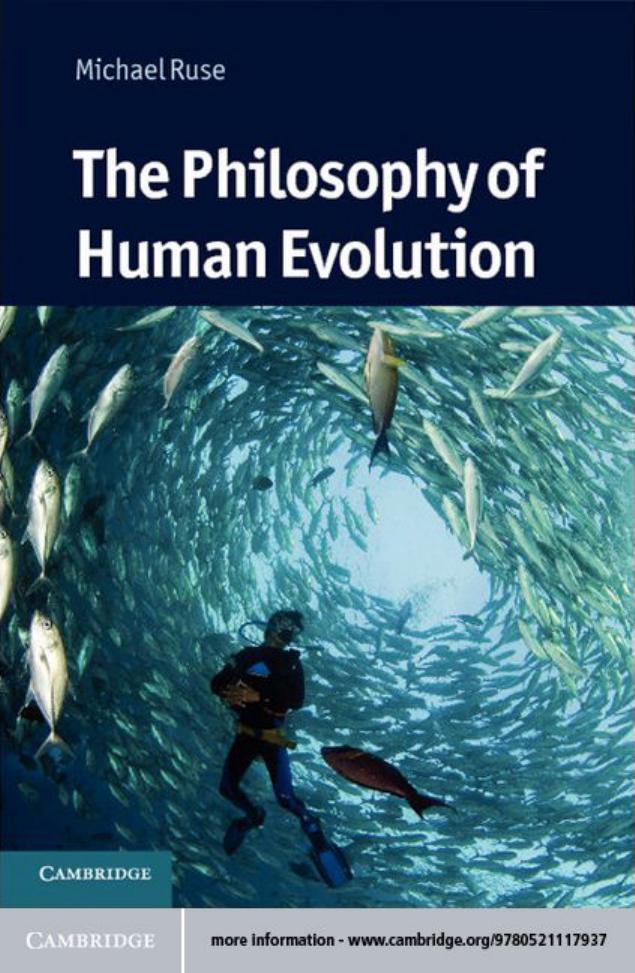The Philosophy of Human Evolution by Michael Ruse

Author:Michael Ruse [Ruse, Michael]
Language: eng
Format: epub, pdf
ISBN: 9780521133722
Publisher: Cambridge University Press
The basic idea is simple. We are born with innate knowledge that was forged in the struggle for existence. Those of our would-be ancestors who had such knowledge are now our real ancestors. Those who did not are not. Nobody of course thinks that this knowledge comes automatically. John Locke, the great opponent of innate knowledge, noted that no one is born knowing that God exists or that parents should love their children. The point is, rather, that in the course of development in culture, certain dispositions channel our understanding one way rather than another. As far as I know, although he was obviously committed to the ideas, Darwin never published on this topic. I don’t think there is any great significance to this. He had lots of other fish to fry. Including morality where, as we shall see, he offered a full discussion. In any case, the topic was being taken up with great gusto by another, namely Herbert Spencer. In his Principles of Psychology, published some four years before the Origin, with a certain justice Spencer thought he was steering a mid-course between the empiricists, who insisted on the primacy of experience, and Kant, who argued for the mind-informing element in knowledge. Like Darwin, Spencer also saw the mind as structured by innate principles or dispositions. Like Kant, Spencer identified these principles with basic mathematical claims and with the underlying principles of scientific thinking, such as the need to see all phenomena and events as having causes. Where he differed from Darwin was in seeing the force behind this picture of the structured mind as essentially a question of Lamarckian inheritance – even into the twentieth century, Spencer’s favored mechanism of change. Where he went beyond Darwin – although it may well have been that Darwin would have been happy to follow – was in tying this all to a firmly Progressionist picture of knowledge. As in all things, as scientists work away at their tasks, we gain an ever-more accurate understanding of absolute reality. With an atypical burst of modesty and a nod to the Kantian thing-in-itself, Spencer did, however, refer to the underlying reality as the (capitalized) Unknowable or Absolute.
Download
The Philosophy of Human Evolution by Michael Ruse.pdf
This site does not store any files on its server. We only index and link to content provided by other sites. Please contact the content providers to delete copyright contents if any and email us, we'll remove relevant links or contents immediately.
Enlightenment Now: The Case for Reason, Science, Humanism, and Progress by Steven Pinker(7303)
A Journey Through Charms and Defence Against the Dark Arts (Harry Potter: A Journey Through…) by Pottermore Publishing(4796)
The Immortal Life of Henrietta Lacks by Rebecca Skloot(4570)
A Journey Through Divination and Astronomy by Publishing Pottermore(4373)
Elon Musk by Ashlee Vance(4118)
Origin Story: A Big History of Everything by David Christian(3679)
COSMOS by Carl Sagan(3616)
Alchemy and Alchemists by C. J. S. Thompson(3506)
Bad Pharma by Ben Goldacre(3417)
Enlightenment Now by Steven Pinker(3363)
Shadow of Night by Deborah Harkness(3352)
Inferior by Angela Saini(3308)
A Mind For Numbers: How to Excel at Math and Science (Even If You Flunked Algebra) by Barbara Oakley(3292)
Origin Story by David Christian(3191)
The Code Book by Simon Singh(3168)
Signature in the Cell: DNA and the Evidence for Intelligent Design by Stephen C. Meyer(3123)
The Elements by Theodore Gray(3048)
A Brief History of Time by Stephen Hawking(3017)
A Journey Through Potions and Herbology (A Journey Through…) by Pottermore Publishing(2843)
